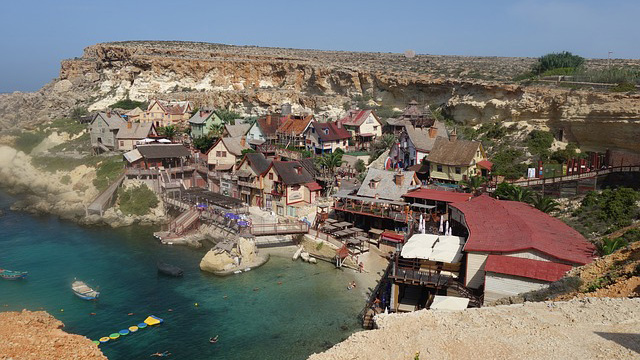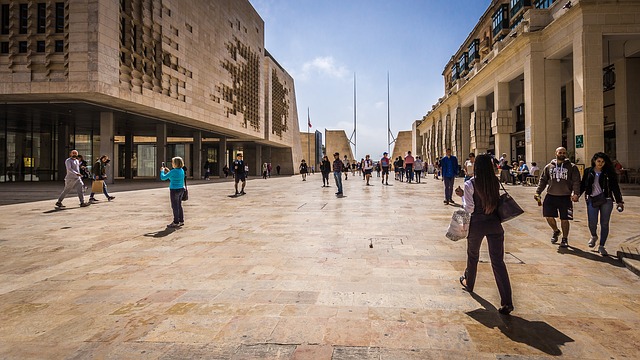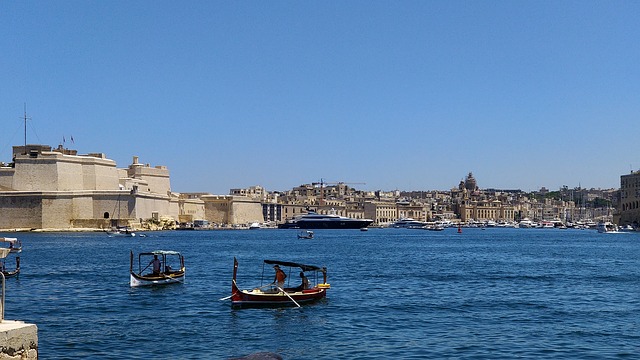Right above eastern Tunisia and under southern
Italy rises a land that was a much-sought jewel by almost every empire and
major civilization that’s ever existed: from the Greeks to the Normans, from
the Romans to the Byzantines, from the Phoenicians to Napoleon’s France.
We are talking about Malta, a Mediterranean
archipelago with one of the richest histories of its region. Its privileged
location, its heavenly beaches, and its cultural mix makes it one of the top
tourist destinations in the Mediterranean.
Going along Vittoriosa, Senglea, and Cospicua,
known as the “three cities,” which have been inhabited since the Phoenician
times and saw the birth of the Order of the Knights of Malta; a tour to the
captivating Hypogeum, with all of its archeological wonders, or submerging in
the beaches of Golden Bay, are just one of the few drivers of tourists, and
culture-savvy expats to the island.
It’s not a coincidence that Malta is known as an
open-air museum where you can travel through its ancient history, follow the
footsteps of St. Paul, and of the Crusaders that shaped the island, all while
moving around a tech-savvy country with a vibrant expat community.
What if we told you that all this also comes with
a thriving, hungry for investment economy that offers plenty of tax
optimizations possibilities? Add to that the fact that Malta has the most
prestigious CBI program on the planet, world-renowned financial services, and a
diversified, tech-savvy, service-oriented economy.
And that’s just the beginning. What if we also
told you in Mundo, we work with the finest experts for CBI and RBI programs in
Malta?
When the
UK started withdrawing its armed forces, many predicted a disaster.
However,
as you may know: those who really want to thrive know how to take advantage of
crises.
That’s
what happened in Malta. The island diversified its economy in the 80s through government
grants, tax credits, and loans to increase the FDI flow.
As usual,
the impact of these state-led measures was limited. That led the island to a
second transformation: during the 90s, a series of economic reforms turned the
country into a market economy, to the point the government sought progressive
privatization of public assets, and finally, all capital controls were
eliminated when the country joined the European Union in 2004.
And since
then, this small yet rocking archipelago has never looked back.
Malta’s
economy is highly diversified and developed. Small economies are usually
uber-reliant of foreign investment, which makes them excessively vulnerable to
external shock.
That’s
not the case with Malta. Don’t be fooled by its size.
Just to
name one example: when all Europe was in chaos because of the economic crisis
in 2010, Malta was the only EU country along with Germany to sustain economic
growth.
What has been
the key? Two factors: diversification and pro-business policies.
Nothing
new.
Especially
after entering the EU, the country has promoted FDI to diversify its economy,
leading to the growth of sectors such as information and communication
technologies, pharma, aircraft maintenance, financial services, and even crypto
services.
Aren’t
you already convinced of investing in Malta?
Mundo´s country rating
is essentially a freedom index whereby our team of specialists rate a
combination of freedoms which include freedom from violence and personal
attacks, financial freedom from high taxes, business freedom from government
interference and especially from socialism and communism.
There’s much to love
about Malta. Don’t let its 300 sq km fool you. This island must be on the map
of every high net worth individual and investor. Its CBI program was a before
and after on the second passport world. The country boasts a favorable tax
regime for investors, diversified and cutting-edge financial services and
licenses. We don’t exaggerate when we say Malta is one of the most beautiful
places in the Mediterranean with a succulent history and culture.
Don’t say we didn’t tell
you. If you’re looking for a new place to invest or to relocate, Malta has to
be at the top of your list.
Let’s tell you why.
Malta is a fantastic place to relocate.
Freelancers, retirees, crypto managers, digital nomads, and entrepreneurs
choose Malta as their spot for its beauty, its beneficial tax system, and the
opportunities it offers.
Its calm ambiance is perfect for expats looking to
run away from the non-stop life of big cities, but still want to enjoy
first-level services in a modern country. Malta is a country open for
foreigners, with a welcoming local population, a vibrant cultural mix, an
astonishing past, and its eyes well-set into the future.
If you
want to relocate to start a new business or wish to enjoy your retirement
savings freely, Malta should be at the top of your list.
Traditionally, CBIs were present in some Pacific
and Caribbean islands that couldn’t provide much aside from a second trustworthy
passport.
“That sounds pretty good to me,”, you may think,
and that’s right. However, in 2014, Malta became the first EU member to provide
an extensive CBI program. Thus, it was the first country to offer extra
benefits in a dynamic investment environment for those who benefit from the
program.
Malta’s CBI was an overhaul. Similar programs
followed it in Cyprus, another EU member, and Montenegro, which will be an EU
member in 2025.
Still, Malta remains the most prestigious program.
Malta is an EU country and received the support of
the organization for its program because of its strong due diligence. The
program is more expensive than most Caribbean programs, but it offers you
secure investments that will actually give you a strong return.
In today’s world, having a second reliable passport is an unmissable opportunity for high net worth individuals and Malta should be at the top of your list. After all, you don’t get the chance to have a EU passport every day.
Malta’s tax system is one of the most sophisticated in Europe. It offers plenty of advantages for high net worth individuals and companies and has different tax regimes for different kinds of companies, foreigners, residents, and citizens.
Such a system is good in the sense the government uses plenty of tax incentives for certain economic activities. However, on the negative side, it means it can be an incredibly complicated and frustrating system.
Still, via deductions, you can lower your corporate tax rate to 0 % (you read that correctly) and that the residence and retirement programs offer a 15 % income tax rate. That means that even if it’s a somewhat complex system, it’s among the best of the best in Europe. Also, even as the VAT is 18 %, which is pretty average, but has compelling lowered rates of 7 % and 5 % on certain products and services (more on that ahead).
If you add to that the fact that Malta has a network of more than 70 double taxation treaties (including discrete jurisdictions such as the Cayman Islands and Macao) and that its system is in full compliance with EU directives… We have a killer combination.
What advantages may be relocating your business to Malta have?
· Low taxation with plenty of incentives that can even exempt you for corporate tax
· Onshore EU-status with access to EU directives
· Tax exemptions on dividends, securities profits, withholding tax on dividends, interest and royalty’s repatriation
· Robust double tax treaty network
It’s the perfect union between a transparent tax system with plenty of benefits and incentives for investors and full international harmonization. This balance is perfect for high net worth individuals who wish to optimize their taxes, but are not in the disposition of going for a jurisdiction that may have a shady reputation.
In Malta, banks are classified into three categories:
1) Core Domestic Banks,
2) Non-Core Domestic Banks, and
3) International Banks. The Malta Financial Services Authority (MFSA) supervises with the ECB, the three largest domestic banks of the country.
The MFSA also supervises the rest of the banks, and it is the first filter for those organizations seeking to start operating in the financial industry in Malta.
The two largest banks in Malta are HSBC Malta and Bank of Valletta, which are the ones that deal with foreigners the most and have the most substantial part of the market share. There are also eight medium-sized banks, of which some as BNF and Akbank are subsidiaries of foreign companies. The other 18 banks are small banks or specialized service providers. For example, Credoarax only offers payment processing for EU merchants.
Even if Malta has an incredibly secure system, it can be tough to participate in it. Maltese personal bank accounts are only open to citizens, residents, and foreigners living in Malta.
Wealth management is a primary goal for many Maltese banks. In the last few years, some service providers are offering Swiss-like private wealth management services. They make available all the preferred investment vehicles for high net worth individuals: hedge funds, equities, and real estate, and it allows investors to protect their legacy through trusts.
Why is Malta an attractive destiny for foreign investors seeking for wealth management services?
Ø First, the country has one regulator for all financial services: the MFSA. Family offices in Malta say they can easily navigate through the intricate regulatory frame as they are conducted with the same authority, which is generally regarded as transparent.
Ø Likewise, the country’s strength lies in its flourishing financial services sector, which offers a wide array of investment possibilities such as AIFs, PIFs, trusts, and more.
Ø Malta has seen a recent increase in investment banking and wealth management services, with reputable and seasoned service providers entering the game
Ø Single-family offices are not designed as profit-making entities in themselves, so their operational costs must be under control. That’s why many family offices are restructuring their operations and expenses, and they are looking at Malta because it offers incredibly competitive fees for all the wonderful benefits that may arise from it.
So, basically, the Maltese system offers you some of the best fund opportunities in Europe, which can be used for wealth management purposes on expert hands with ideal infrastructure and a friendly regulatory regime.
We must say: Malta is among the top fund jurisdictions in the planet. There’s a good reason why there are nearly 700 funds established in the country under its top classifications and schemes, which benefit from the friendly tax regime and top financial infrastructure of Malta.
If you’re looking at your next investment in Malta, funds should be one of your top options.
Since Malta joined the EU in 2004, the country became a top jurisdiction for corporate holding structures with different ends such as multinational groups and asset holding for high net worth individuals. In the last few years, the authorities have been active in renewing the laws and regulations regarding trusts and foundations.
Choosing the best trust jurisdiction is tough. It depends on many factors, such as the regulatory legal framework, the competence of service providers, operational costs, and the judicial system. The reforms conducted since 2014 has turned Malta into a trust-worthy jurisdiction for those wanting to protect their legacy.
Likewise, Malta is an advantageous jurisdiction
for those who want to establish forex, crypto, and gaming services.
All of these three services have their particular
licenses. Forex companies follow the same licenses that investment services,
and crypto and remote gaming have four-class licensing system.
Malta is a service-oriented economy. While so many
countries are seeing services such as forex, e-gaming, and cryptocurrencies
with dismay, Malta is offering them an opportunity to thrive with a beneficial
tax system, a strong regulatory frame, and allowing them to settle in a secure
jurisdiction.
Malta was the first EU member to regulate the
e-gaming industry and the first in the world to regulate the cryptocurrency
investment industry. It’s been a frontrunner in innovative financial services
and licenses to attract new investors to the country, and it has worked.
Today, the country is home of dozens of investors
in those industries and has become a hub and a safe haven for the crypto world,
e-gaming, and legit forex investors.
Some EU countries look at this type of businesses
as second-class businesses and try to suppress them with the excuse that they
promote money laundering. This is a complete lie.
E-Gaming, FOREX, and crypto are legit businesses
that are attracting reputable investors and can offer significant gains for
those willing to take the chance. Malta knows this and that’s why it has become
a harbor for the investors in these areas, offering them a safe jurisdiction
with impressive services and possibilities for them.
A plethora of investors are closely supervising Malta.
It has a strong expat community, the economy is booming, and the CBI and RBI
programs require investing in real estate.
All this means Malta has a dynamic real estate
with strong investment returns for those willing to invest in the market.
Find a home that fits your needs and of your
family is a must in Malta. For its size, the country has a deeply diversified
market, with luxurious seaside properties, comfortable villas, and downtown
apartments close to the business centers in Valletta.
You can buy a luxurious villa at a walking
distance from some of the more gorgeous heavenly beaches of the Mediterranean,
at a fraction of their cost in Southern France or Greece.
What if you already have a home in Malta or don’t
want to relocate there? Well, the real estate market is booming and offers
impressive options for investors willing to invest in the real estate business
for wealth management purposes.
However, investing in real estate in Malta has its
particularities. Buying and selling property has some specific taxes, and your
nationality may be a factor to consider regarding the procedure for buying
property in Malta.
But it’s worth the bet. The real estate prices can
go up as much as 15 % per year, which is terrific for investors. Malta real
estate is widely considered as one of the best investments you can make across
the EU. The market isn’t growing because the government eased conditions for
buying properties or for getting credit. The rise is due to the overall
economic growth of Malta, fueled by its sound macroeconomic policies, job
creation, and an influx of expats.

Opening a company has quite a resemblance to starting a family. We always seek to provide our heirs with the best possible circumstances, ones that offer them stability, confidence, and sustainability. The same approach applies to our financial creations: we always look for their wellbeing.
Luckily for us, there are countries that outstandingly comply with those principles, one of them being the Island of Malta, the famous Mediterranean jewel.
The way in which this country has attracted so many investors over the past decade shouldn’t come as a surprise for anyone. The local legislation regarding company formation is specially designed to facilitate all mandatory procedures, the reason why the whole process usually doesn’t take more than a full week.

The Government of Malta is run by the president as the constitutional head of state. The system can be described as a parliamentary representative democratic republic that has to maintain stability over the years.
Ministry for Foreign and European Affairs: This Ministry has the responsibility to manage the international diplomatic missions. In addition, it has the mission to maintain the country’s external relations.
Ministry for Quality Research and Innovation: In this case, this Ministry is a specialized body that implements policies in the fields of technological development, innovation, and research.

The Maltese Nomad Residency Permit and the Economic Incentive for Visitors
Without any doubt, one of the perfect vacations you may imagine starts with a sunset in the Mediterranean Sea with a bottle of the finest wine in your hand. In Malta, this is perfectly possible for your next vacation as this country is not only having one of the highest vaccination rates in the world, also is offering several incentives to the visitors that arrive in the country; for this reason, it is considered one of the best places to travel in 2021.
$170,000
$1,400,000
$350,000
$395,000
$185,000
Интерес к формату CBI растёт, особенно среди тех, кто рассматривает международную диверсификацию ста...
Когда речь заходит о программе квалифицированного инвестора, чаще всего обсуждается недвижимость. Им...
Решение сменить страну проживания всегда связано с вопросами уверенности и предсказуемости. Человек ...
Панама давно привлекает внимание людей, которые рассматривают переезд, инвестиции или покупку жилья ...
Международные инвесторы рассматривают недвижимость как инструмент сохранения капитала и формирования...
В последние годы Панама стала одним из самых привлекательных направлений для международных инвесторо...


.webp.small.WebP)
.webp.small.WebP)
.webp.small.WebP)
.webp.small.WebP)
.webp.small.WebP)
.webp.small.WebP)
.webp.small.WebP)
.webp.small.WebP)
